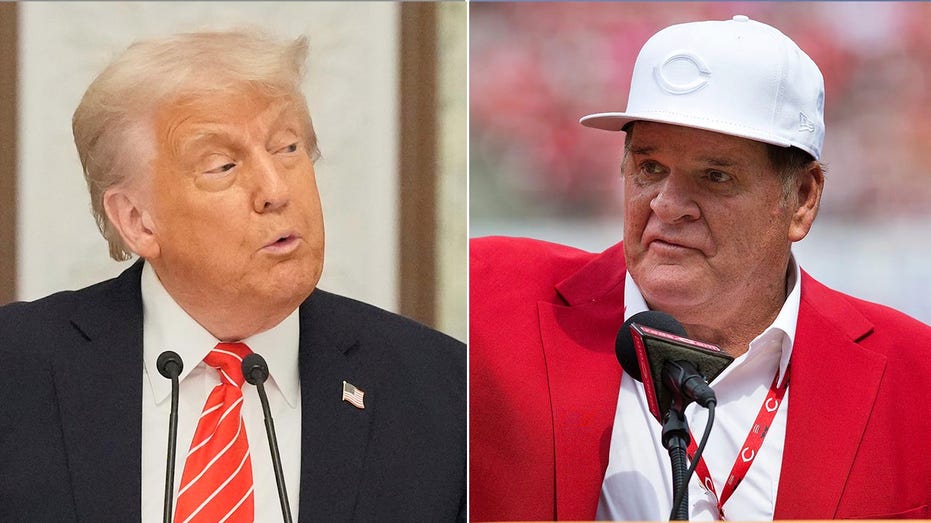In the world of Major League Baseball (MLB), Pete Rose’s name is often synonymous with controversy and debate. The former Cincinnati Reds player and manager has been under a lifetime ban from baseball since 1989 due to his connection with gambling. This ban continues to be a topic of heated discussion among fans, players, and officials. Recently, MLB Commissioner Rob Manfred revealed that former President Donald Trump is one of the “supportive” voices advocating for Rose’s reinstatement to the game.
During a recent press conference, Manfred acknowledged the ongoing conversations around Rose’s lifetime ban and discussed the various stakeholders who have expressed their support for the legendary player. He noted that not only has Trump weighed in on the matter, but other influential figures in the sports world have also shown interest in re-evaluating Rose’s status. This growing momentum raises questions about the future of Rose’s eligibility and how it might impact the MLB community.
For those unfamiliar with the particulars, Pete Rose is renowned for being MLB’s all-time hits leader, with 4,256 hits to his name. His remarkable career spanned over two decades and included three World Series titles and multiple All-Star selections. However, his achievements have been overshadowed by the scandal involving his gambling on baseball games, including games played by his own team.
The fallout from Rose’s actions led to a permanent ban from baseball. He has since sought reinstatement numerous times, claiming he has changed and that his previous actions should not define his entire legacy. Many fans and several players have rallied around him, asserting that Rose deserves another chance, as his on-the-field accomplishments are unparalleled.
While Manfred did not elaborate on the specifics regarding Trump’s involvement in the discussions, the fact that such high-profile figures are advocating for Rose’s reinstatement suggests a shift in perspective regarding how baseball handles past infractions. The discussion surrounding Rose isn’t just about one man’s redemption; it embodies a broader examination of how the league views gambling, integrity, and the legacies of its greatest players.
Supporters of Rose argue that the time has come to reconsider punitive measures for historical offenses, especially in light of how the perception of gambling has evolved in media and sports. With the recent legalization of sports betting in many states, questions arise regarding consistency and fairness in how rules are enforced. Critics, however, caution that allowing Rose back into baseball could set a dangerous precedent, implying that the league may be willing to overlook serious rule infractions if enough influential figures advocate for it.
Commissioner Manfred indicated that the discussions surrounding Rose’s eligibility are not simply political maneuvering but involve a careful consideration of the moral and ethical standards of the sport. In the past, he has maintained that the integrity of the game must remain paramount and that the consequences of Rose’s actions were significant in maintaining that integrity.
Furthermore, Manfred referenced the ongoing conversations about gambling within MLB, highlighting that while the league recognizes the changing landscape surrounding sports betting, the implications for a player or leader who violated existing rules cannot be overlooked. The balance between allowing for second chances while simultaneously upholding the integrity of the game is precarious, and baseball is treading carefully through this complex issue.
Supporters of Rose believe that restoring him back into the fold of MLB would allow for healing. They suggest that his presence could bring a deeper connection to the historic and emotional narratives present in baseball. Many point to other athletes who have overcome adversity or past mistakes, emphasizing the power of redemption and the human story behind sports.
The conversation surrounding Rose has also drawn parallels to other high-profile cases in sports where individuals received second chances after committing significant violations. Whether it is a player facing substance abuse issues or one involved in unsavory public scandals, the principle of redemption remains a powerful narrative within competitive sports.
In addition to discussing Rose, Trump has consistently voiced his support for traditional American sports, adopting an “America First” approach that also extends to cultural icons like Rose. This alignment could resonate with sections of the fanbase who feel a personal connection to Rose’s story and the impact he has had on baseball history.
This dynamic raises the question: what does it mean for MLB to evolve while also honoring its past? The league exists in a delicate balance between respecting the traditions that uphold it, while also embracing modern societal values and changes in attitude. With figures like Trump advocating for Rose, it certainly adds complexity to the narrative.
While there has yet to be any formal action on lifting Rose’s ban, discussions are likely to continue, fueled in part by his supporters and high-profile advocates. The implications of such a decision could reverberate throughout the league, impacting not just Rose, but the very fabric of the league itself and its ongoing legacy.
Interestingly, a recent poll shows a significant percentage of fans support reinstating Rose, illustrating that public sentiment may be shifting. Advocates for his return highlight that Rose did not just break the rules; he transformed the sport in many ways. The combination of his iconic play and the circumstances that led to his ban creates a potential narrative that could captivate both new and old fans alike.
In light of these discussions, it is essential to remember that baseball is not just about numbers; it is about stories, legacies, and the interplay between error and forgiveness. If Rose’s ban is lifted, it could lead the way to new conversations about sportsmanship, integrity, and ultimately what it means to be part of the baseball family.
As the future of Pete Rose remains uncertain, his legacy continues to provoke conversation. His journey highlights larger themes within sports regarding accountability, redemption, and the ability for individuals to grow beyond past mistakes. For now, the debate around his untouchable status persists, with influential voices stepping up in support of a player who changed the game, for better or worse.
In conclusion, as discussions about reinstating Pete Rose progress, it remains an unfolding story that captures the intersection of sports, culture, and society. The coming months may hold significant developments, as the voices supporting Rose’s return grow louder – one of them belonging to a former president. With such influential backing, the discourse surrounding Rose’s place in MLB history is likely to intensify, prompting the league and its fans to reflect on what it truly means to play the game, fight for redemption, and embrace the spirit of inclusion in the context of sports.
































